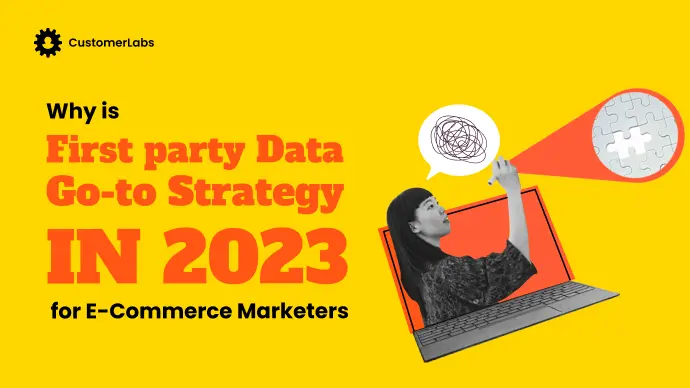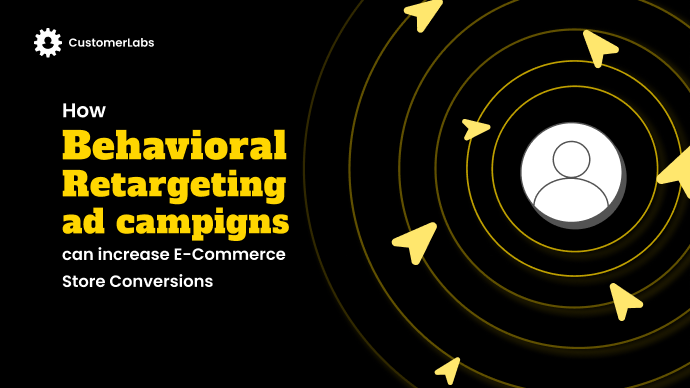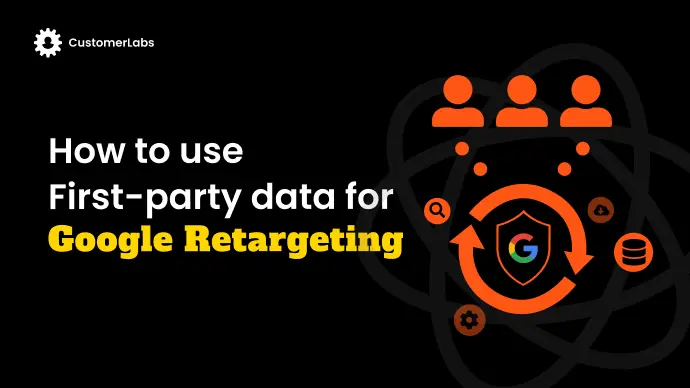
Major data-privacy updates happening across the world might have reduced your Google Retargeting ad campaign performance drastically! Know what it is and how to tackle it before doomsday arrives.
As an eCommerce marketer, you should be prepared to adapt to all the changes that are to come.
With first-party data you can scale your Google Retargeting ad campaign performance to achieve high ROAS.
Read on to understand what will happen in the next few months that determines the coming years of digital marketing, and how to swim through those tough tides to set a smooth sail in the ocean of uncertainties.
What is Google Retargeting?
Google retargeting means showing relevant ads on Google’s products such as Google Search, Gmail, Maps & other websites with adsense, to your website visitors after they leave the website.
This retargeting ads strategy is one of the best ways to improve your conversion rate by driving prospective buyers who have already expressed interest in your product or service to make a purchase. It can also be useful for businesses looking to re-engage with previous website visitors (including known and unknown website visitors) or upsell or cross-sell to existing customers.
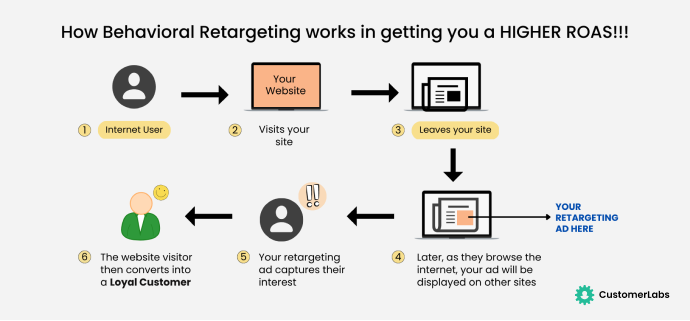
To know more on How Behavioral Retargeting Ads work, read the extensive blog – Behavioral Retargeting: Key To Increase eComm Conversion 2X!
You can increase your conversion rate by 3X times using retargeting ad campaigns, says Google.
Why The Sudden Decline in Google Retargeting Ad Campaign Performance?
There are several factors that may have contributed to the decline in the performance of Google retargeting ad campaigns, with the main reasons being
- Data-privacy updates from various governments across the globe.
- Browsers like Safari & Firefox block third-party cookie tracking – making it difficult for the Pixel to track user behavior.
- iOS 14.5+ updates by Apple – Restricts the tracking of user behavior across the apps & browsers
- Android Privacy update by Google similar to iOS 14+ updates.
How do Privacy Regulations, iOS’14 update & Third-party Cookie Phase-out Impact your Google Retargeting campaign performance?
Like we said above, Pixel tracking helps track the website visitors, their behavior, etc. Due to the recent happenings like the privacy regulations, Apple iOS’14+ update, Google’s tracking ability is severely limited making Google’s access to iOS’14 user behavioral data close to none.
You might have observed a decline in ad campaign performance which was evident through the campaign performance report in google ads.
Source: Google
Note: The same challenge applies to Facebook campaigns as well.
Who is Impacted?
The data-privacy updates & the above changes will impact digital Marketers & eCommerce advertisers who run personalized retargeting ads.
The drop in ad campaign performance leads to a decline in ROAS & increase in CAC, making the marketing strategy inefficient.
Strategy to Improve your Google Retargeting Ads Performance using First-party data
For you to not be impacted by these updates and be consistent in your growth without any stumbling performance of google ads, collect first-party data, your only savior.
Google & Meta ad platforms‘ AI & Machine Learning tools stress on the need for first-party data to train the algorithms and deliver a perfectly timed personalized experience to all the users. Thus, reiterating the importance of collecting the first-party data as early as possible.
According to the ‘Next in Personalization 2021 Report’ by McKinsey, more than 70% of people expect personalized experiences.
Your strategies aided by First-party data, will be a solution to enhance the Google Ads performance.
First-party data – The Future of Advertising
First-party data is the information directly collected from the customer using various channels including the website. Of the website visitors, only 2% are known visitors whose complete profile is available. But, 97 to 98% of the anonymous website visitors’ data is left out as they feel it is practically impossible to collect, identify & retarget them on Google/Meta or any other Ad Platform.
First-party data collected by CustomerLabs has parameters such as browser ID, Click ID, IP address, etc., for each website visitor that are synced with the ad platforms, increasing the match rates and therefore will enhance the retargeting ad campaign performance on Google or any other ad platform to a greater extent with better user attribution. Therefore you can retarget many users with the right ad at the right time, adapting to the futuristic trend of hyper-personalized user experience,

Advanced Audience Segmentation to Increase Ad Personalization
To increase the efficacy of your ad campaign performance and to run behavior-based personalized ads, you should segment your audience based on their behavior.
According to epsilon, 80 percent of the customers report they are likely to purchase from a brand that offers a personalized experience.
Example Segments for Anonymous Visitors Based on Funnels
- Cart_abandoned for more than 60 days – MoFu (Middle of the Funnel)
- Product _viewed_more than two times – MoFu (Middle of the Funnel)
- Initiated_checkout_not purchased in the last 90 days – MoFu (Middle of the Funnel)
For anonymous visitors, the above segments are created based on their behavior. Thus you can run personalized ad campaigns based on their segment buckets leading to higher ROAS. Such segments when synced with Google & Facebook will drive higher conversions.
Example: For a bunch of anonymous visitors who checked a particular product such as white shoes, can be segmented and shown personalized ads with a 30% discount for white shoes to make them purchase the product.
Example segments for known visitors
Customers who purchased
- products on Black Friday sales last year
- apparel jeans before six months.
- candles on Christmas sales last year
- Black suit for last year End of Season Sale
or subscribed to your newsletter or email.
The intent to build known visitor behavioral segments is to make them purchase again.
Example: A group of customers who bought a pair of candles last Christmas can be segmented and shown ads with a discount this year to make them purchase again during this holiday season.
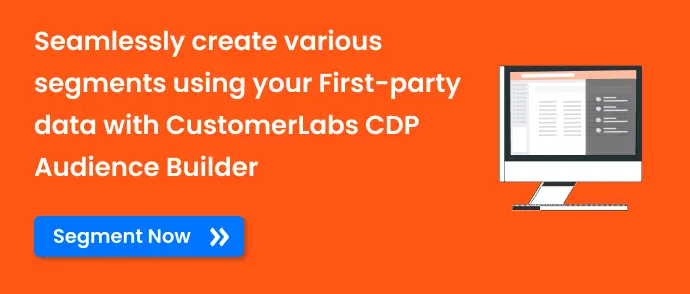
Experimental Proof: We Achieved Higher Match Rates using First-party data with Google Retargeting efforts!
Google & Meta match rates have fallen drastically below expectations. Meta is able to provide only around 25% custom audience match rate with the data collected by Pixel. And Google was able to offer match rates between 29% and 62% and nothing beyond, for both known and unknown visitors.
We have collected & synced our website’s first-party data with Google and below are the startling results we achieved:
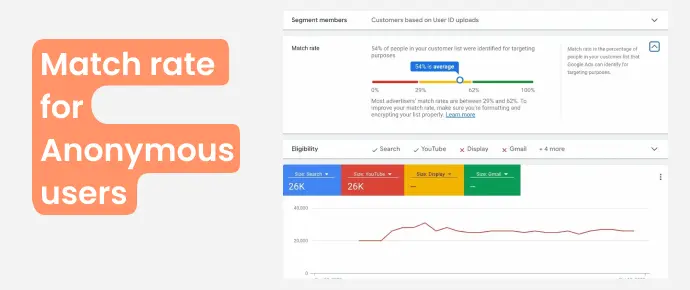
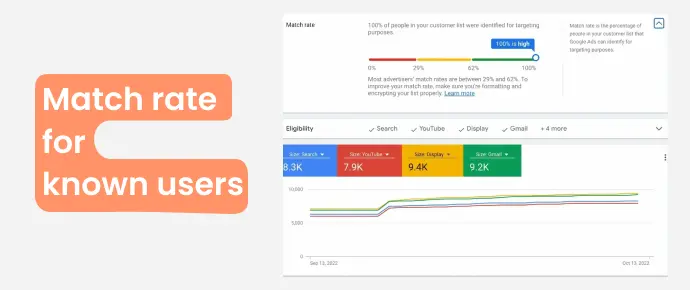
Such startling results will increase your Google retargeting ad campaign performance and will provide you the opportunity to scale your ad campaigns.
Similar to the above, we witnessed a custom audience match rate of more than 80% on Meta Ads Manager using the first-party data collected by CustomerLabs.
In addition to the above, the campaign performance report on Google ads showed unbelievable numbers for all our Clients who used First-party data to run their ad campaigns.
Get High Google Custom Match Rates with CustomerLabs – Sign Up for a 14-day Free Trial!
Latest Updates from Google
2023 and the coming years will bring a revolutionary change in the digital marketing space. That change is going to transform the marketing landscape as we know it. Get ready for a marketing revolution!
Google has announced that there will be
- No more Similar Audience (also known as Similar Segments) feature on Google Ads
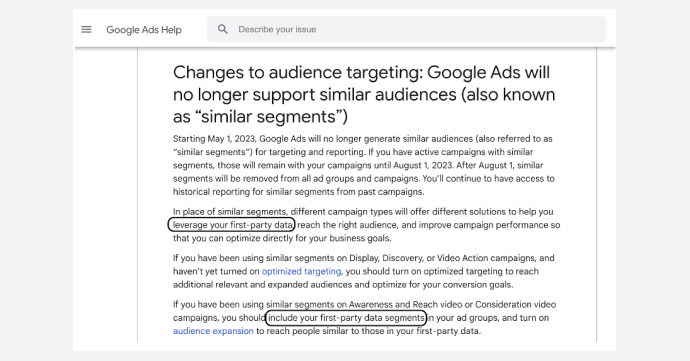
2. Increased focus on Google’s Performance Max Campaigns
Performance max campaigns help you work towards a goal of your choice by optimizing the budget, attribution, and audiences, based on the real-time performance of the ad campaigns across various channels that include YouTube, Google Search, Gmail, Discover, Display, & Google Maps. Thus, improving the Google ads performance of retargeting ad campaigns.
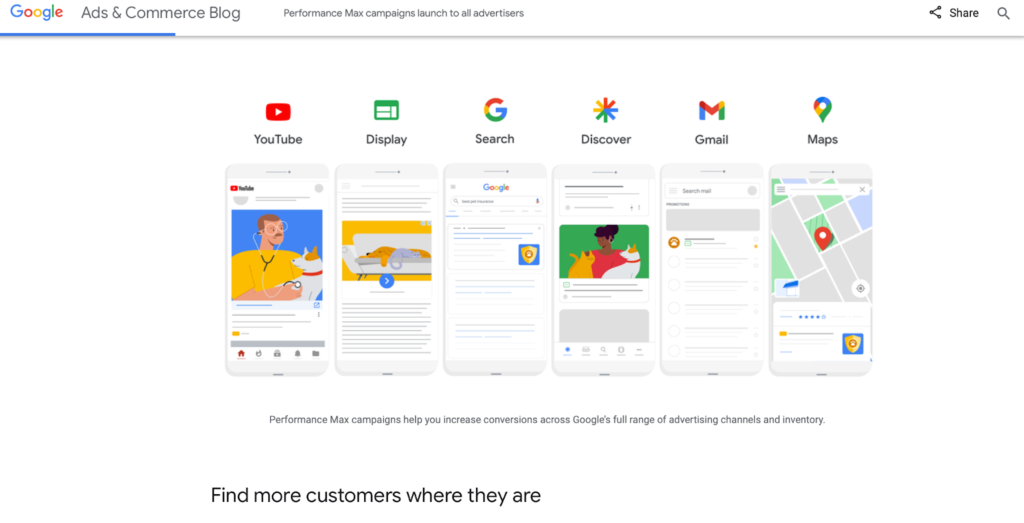
That is why not just us but all the industry leaders like Google, Meta, etc., are saying, First-party data is the go-to strategy for Marketers in 2023!
Quick Recap of Google Retargeting & How eCommerce gets Benefited
Google Retargeting strategy is one of the best to increase your ROAS. However, the recent data-privacy updates have shrunk the Google ad campaign performance including the performance of the performance max campaigns. As suggested by Google, it is recommended to use First-party data to increase the ad campaign performance of the eCommerce businesses.
Benefits of using First-party data for Google retargeting:
- Economical: You need not depend on other sources for data as you can collect the first-party data at the most economical cost. Therefore, it is less expensive compared to collecting & gathering other data.
- More accuracy: First-party data is more accurate than third-party data providing better results for ad campaigns.
- Unique: First-party data is unique – your competitors won’t have access to your data.
- Increased Ad campaign performance: First-party data helps increase marketing performance & ad campaign performance.
- Improved Personalization: Users can be shown highly personalized ads
- High Conversion Rate: First-party data drives a higher conversion rate leading to greater ROAS as the ads are highly personalized.
Be ahead to encash the benefits of Google Retargeting with First-party data to increase your eCommerce store conversions by 2X times & your revenue by at least 20% with the help of advanced audience segmentation.


